Oil or vegetable oil is the most popular and commonly used oil in the world. Its use has its positive and negative features, which are better to know, especially if oil is consumed daily. There is sunflower oil, olive oil, coconut oil and vegetable oil from rapeseed, linseed oil, castor oil, etc. Most appropriate for use is sunflower oil. Recently, the advantages of rapeseed oil have been touted, but not for extensive culinary use. Vegetable fat, canola and flaxseed are suitable materials for making other products in the cosmetics, chemical, pharmaceutical industry and others, not for immediate consumption.
The term oil is recognized mostly as referring to sunflower oil. In essence, oil is the end product of oil and oil-bearing crops go through mechanical pressing, or extracting it chemically. It can be refined or unrefined, mainly by extraction of the seeds of plants. Sunflower seeds come from the steppe lands of North America, and arrived in Europe as an ornamental plant in the beginning. Around 1520, sunflower was transferred to the Botanical Garden in Madrid. Exploiting it as an oilseed crop began only in the early 19th century, when they began to yield oil in Russia.
Sunflower oil is extracted from the seeds of the sunflower (Helianthus annuus). They are the third most common oilseed crop after soybeans and rapeseeds in the world. Today, the largest countries in producing oil are China, Russia, Argentina, France, Russia and Australia. Within the old continent, Bulgaria is one of the most important and major producers of sunflower and vegetable oil. There is a large selection of cultivated varieties.
Crude oil is obtained by crushing the raw seeds and their hulls. This oil is extremely rich in vitamin E, omega-6 fatty acids and omega 9 EFAs. It does not contain residual toxic agents (acids) from chemical treatments, because they are not used in the manufacturing process. Refined oil can even be single or double refined. It is obtained from chemically dried or roasted seeds, filtered repeatedly to eliminate all protein residues. The advantage is that vegetable oil contains no cholesterol - this only comes from animal fats.
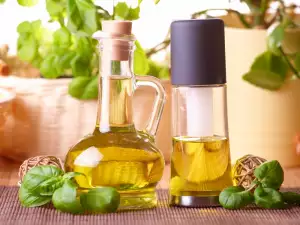
The oil is a calorie product, useful mainly with essential fatty acids, which it feeds the human body with. Unsaturated fatty acids are metabolized in the body in different ways and their derivatives are obtained, which are essential for normal functioning of basic life functions. They participate in the regulation of vascular tone and the tone of smooth muscle organs in fertility and the reproductive function in birth, as well as the clotting process.
Oil needs a rational fat diet, however, use should be in the range of 68 to 138 g per day, the values depend on sex, age and physical activity. In a healthy diet, the share of fat should constitute about 30% of your total energy balance.
Composition of oil
Oil is a source of unsaturated fatty acids. In 100 g of pure oil contains:
- From 48% to 74% linoleic fatty acid - Omega 6 EFAs;
- From 14% to 40% oleic fatty acid - omega 9 EFAs;
- From 4% to 9% palmitic fatty acid;
- From 1% to 7% stearic fatty acid.
Oil is extremely rich in omega 6 and omega 9 fatty acids, the rate is different in different brands of oil. Moreover, oil is a major source of lecithin, vitamin E (a powerful antioxidant) and vitamin A.
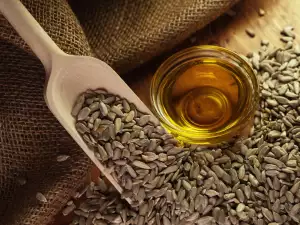
Types of oil
Sunflower oil - the most known and used oil. There are almost undetectable odor and a high smoking point - 230 degrees. This oil makes it suitable for almost any culinary use- flavoring salads, steaming, frying, etc.
Olive oil - according to the way it is obtained, there are several different types of olive oil - Virgin, Extra virgin, Pure and Pomace. The first two types are obtained by mechanical extraction without the participation of any solvents. Pure olive oil is a blend of refined and unrefined olive oil and Pomace is made using chemical extraction.
Untreated types of oil should not be used for frying because at a higher temperature, change occurs in their composition. They are perfect for salads. Refined and olive oil has a high smoke temperature, making it suitable for frying.
Corn oil - obtained from the germ of corn seeds. A pale color and almost no flavor are present, and its boiling point is higher. The problem with this type of oil is the large amount of polyunsaturated fats it contains, because they cause a reduction in the levels of good cholesterol.
Soybean oil - a new product that is gaining popularity. Obtained by chemical extraction and can be used for all culinary needs. It also has a large number of polyunsaturated fats.
Walnut oil - along with olive oil, it was a major vegetable oil, used before the sunflower entering as a widely used agricultural culture. It is derived from pressed dried nuts. It’s not refined, so it has a rich flavor and aroma, but is more perishable. It must be stored in the refrigerator. It is used for salad dressings, frying extracts a bitter taste.
Canola – nowadays, it is one of the most widely used vegetable oils. It is rich in monounsaturated fatty acids, but contains toxic erucic acid, which does not make it suitable for everyday use.
Sesame oil - vegetable oil, widely venerated in the East. It occurs in two variants - light that comes from raw seeds whose taste is subtle but makes significant changes to the taste of cooked food. The second type is dark sesame oil, obtained by pressing roasted seeds. It has an intense flavor, so only a few drops of it are enough.
Grape seed oil - used for all culinary purposes. There is a weak and neutral taste of nuts. Studies show that most of the nutrients contained in them give similarities to wine in this type of oil.
Peanut oil - Olive oil is an essential part of the Mediterranean cuisine, as is peanut oil - in the cuisine of East Asia. Withstands very high temperatures, which makes it suitable for frying. Iy can be compared with olive oil in its volume of monounsaturated fatty acids, and the nuts in it make it very suitable for people with allergies.

Pumpkin seed oil - produced in the border region between Austria, Slovenia, Croatia and Hungary. This type of oil has a green color. Used to flavor salads and other cold dishes.
Selection and storage of oil
When choosing oil, you should require it to be very clean, shiny and have clarity. It is universal - has good taste, useful for frying, cooking and salads. Quality oil should begin to smoke at a temperature above 200 degrees, does not spray fat everywhere.
Choose sunflower oil from certified producers. The shelf life of the oil is at least two years after opening the package.
Proper storage of sunflower oil is important for its taste qualities. Do not hold the bottle with oil in direct sunlight and high temperatures. Durability depends on heat, light and moisture, so the oil should be stored in dark, dry and cool place. If you do not close the cap well, the oil will oxidize faster.
Oil in cooking
Sunflower oil is one of the most preferred fats for cooking applications, because its price is relatively low compared to that of olive oil. It is also versatile - excellent for fresh use, for frying, baking and cooking. Crude oil is used to eat raw - for salads, dressings and more, it’s refined and has a wide culinary use due to oxidation of essential fatty acids as a result of heat treatment does not easily oxidize.

Oil is one of the main ingredients of mayonnaise and margarine, used to prepare chutney, pickles and winter supplies. It has been shown that the absorption of many vegetables is better if they are tampered with it. Good effects of oil on human health come only if consumed in reasonable amounts.
Benefits of oil
The presence of vitamin E makes it a powerful antioxidant. It has a positive effect on the immune and cardiovascular system. Lecithin in oil helps the functioning of cells, providing material for their cell membranes. Unsaturated fatty acids are important for the regulation of vascular tone and the tone of smooth muscle organs. It is important for fertility and reproductive function in the birth act, and in the process of blood clotting. Because of low or almost no cholesterol, oil spares the heart.
Oil has, to some extent, an antimicrobial effect. If applied to the skin, it reduces its susceptibility to infections. An old Russian recipe for bleeding gums and periodontal disease is a gargle with Arcol before brushing with oil. It is believed that this gargle with Arcol helps get rid of poisonous toxins in the liver and gallbladder, as they gather in the gums. The benefit of the oil on the gums is because it contains vitamin A. This method is recommended by Russian doctors, they suggest you gargle with Arcol oil as a way to detoxify the whole body. Through the mouth, the entire body is detoxified, which in turn strengthens the cells, tissues and organs.
Doctors recommend for you to gargle with Arcol, daily in the morning on an empty stomach and in no case should the resulting liquid be absorbed, because it is full of toxins. After you gargle with Arcol, rinse thoroughly with water. To speed up the effect, the procedure can be done before meals and at night, with best results achieved with cold-pressed oil. An additional effect is teeth whitening. This Russian method positively affects headaches, bronchitis, gastrointestinal and kidney disease, osteoarthritis, as well as female diseases.
Dangers of oil
Shortage of essential (unsaturated) fatty acids (EFAs), as found in the oil are found to stunt growth, impair aquatic metabolism, decrease immunity, kidneys and show skin manifestations. The oil must be sequenced with the consumption of other fats. Heavy oil could worsen the balance between omega-3 and omega-6 EFAs, which in turn affects the immune system worse.
It was found that the use of cooked refined oils increased risk of malignancies. This is because it contains chemical contaminants and oxidation of linoleic and oleic ECN. Rancid oils are toxic and should not be consumed. Oils subjected to the hydroenese process are harmful to human health because they bring trans fat into the body, so many of us can gain weight and have heart problems.

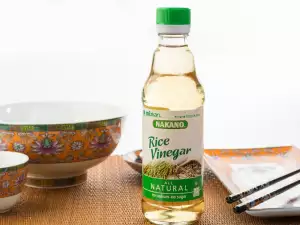

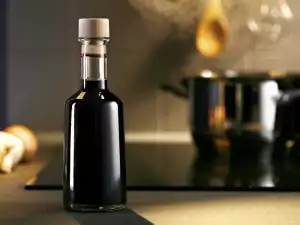



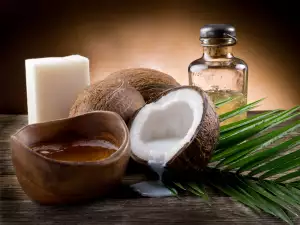
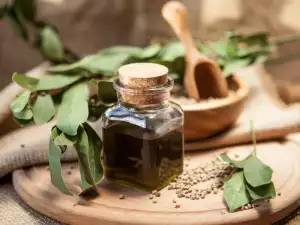
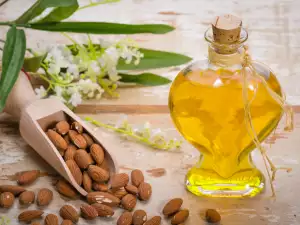

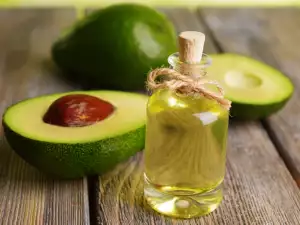
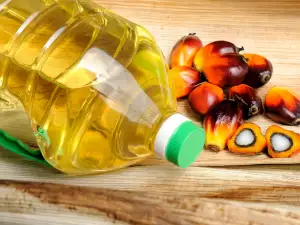
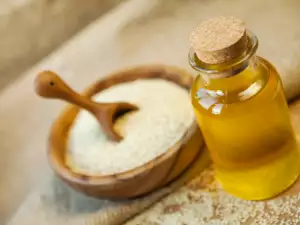
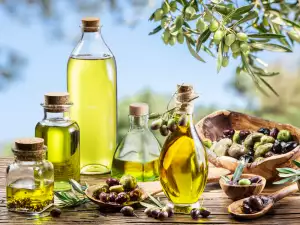





Comments